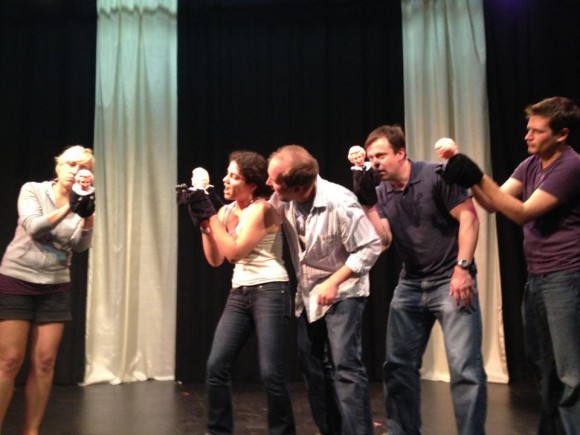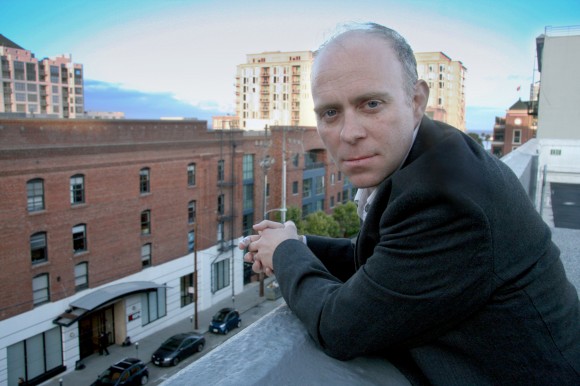Enron the Play Makes its Debut on the West Coast
The banality of greed, the excesses of unencumbered market capitalism, the danger of too cozy a relationship between business leaders and government—apposite topics for a contemporary play given the persistence of the financial downturn that began in 2008 and continues to wreak financial havoc.
While the predominant narrative embraced in the public discourse insists culpability for the recent economic downturn lies with rapacious Wall Street bankers, Lucy Prebble’s exposé of the behind-the-scenes boardroom drama and malfeasance at Enron at the beginning of the new millennium hints at an inveterate American cultural phenomenon.
Perhaps this accounts for the poor reception Enron, the satirical British play, received on Broadway after innumerable accolades were heaped on it during its run in London’s West End—it’s discomforting to look in the mirror and find yourself face to face with your own vapid materialism and corruption.
Enron as a whole does a masterful job of unraveling the complex financial practices that undid Enron following its astronomical rise to fortune, as judged by someone lacking business acumen. It also commendably grasps at trying to expound upon the psychological complexities that drove these highly intelligent men to engage in ignominious behavior.
The play centers around executive Jeffery Skilling (deftly portrayed by Alex Plant), an introverted genius turned sociopath disguised as a suit. His successes and failures coincide with those of the corporation: he scrambles to climb the corporate ladder, getting a promotion over his interoffice executive rival and part-time paramour Claudia Roe (Ms. Laurie Burke) by ingratiating himself with his boss Kenneth Lay (GreyWolf).
Taking a cue from financial whiz and milquetoast Andy Fastow (Nathan Tucker), Skilling formulates an innovative plan to transform Enron into a virtual company based on futures trading in commodity markets; simultaneously, Skilling has Fastow set up a phantom corporation to offload any debt incurred, taking advantage of Fastow’s schoolboy desire to fit in and be just one of the good ol’ boys.
Profits at Enron soar, and a red arrow pasted on the back wall of the stage symbolically measures the success of Skilling’s and Fastow’s highly-profitable machinations and the power that comes as a result–enough to bully most of the major banks and investment firms, illustrated by a cheeky sequence featuring a conjoined Lehman brothers meandering across the stage.
In the background, Lay, the unctuous old huckster and southern gentleman C.E.O., engages power brokers, congresspeople and lobbyists on Capital Hill arguing for the merits of deregulation.
Everything comes together for Enron after George W. Bush is elected president (after some election-night confusion which the play facetiously recounts in a well-designed separate sequence) resulting in the deregulation of the California electricity industry and the crippling rolling blackouts that followed in 2001.
When the ruse begins to backfire, however, is when the play really reaches its apex; it’s hard not to snicker darkly in knowing anticipation as the gauche Fastow becomes increasingly agitated–his eyes growing wider and behavior more erratic–feeding dollar bills to a trio of screeching velociraptors (a stage device for his accounting sorcery) to offset mounting business losses.
It’s also hard not to agree with previous reviewers in that the pervasiveness of visual metaphors feels a tad fulsome towards the end of the play and can be at times distracting. Some of the devices, like Skilling’s bubble blowing daughter and the aforementioned raptors work well; others, like the several scenes with ventriloquist dummies meant to represent business day-traders, get tedious after awhile.
But the vivaciousness of the cast makes up for any shortcomings in the script. For instance, when things at Enron are going into meltdown and Lay (GreyWolf) asks “Do you wanna pray with me, Jeffrey?”–the disdain with which Skilling gingerly takes Lay’s hand is palpable in his expression and revealing of his inner thoughts.
Skilling answers to no one, God or man. His behavior though, while abhorrent, does not seem particularly aberrant given the clamoring in the United States for the freedom to follow one’s rational self-interest ad nauseum notwithstanding the consequences to other’s lives (many Enron shareholder’s lost their life savings in the stock crash).
Therein lies the biggest question the play raises—the impasse in explaining what it means for an average group of executives to carry out an economic swindle of unheralded proportion, and when caught red-handed, show little or no remorse for the destruction they wrought.
Performances of Enron put on by Open Tab Productions continue through August 17 at San Francisco’s Exit Theater. For more information or to buy tickets, please see www.enron2012.com .









